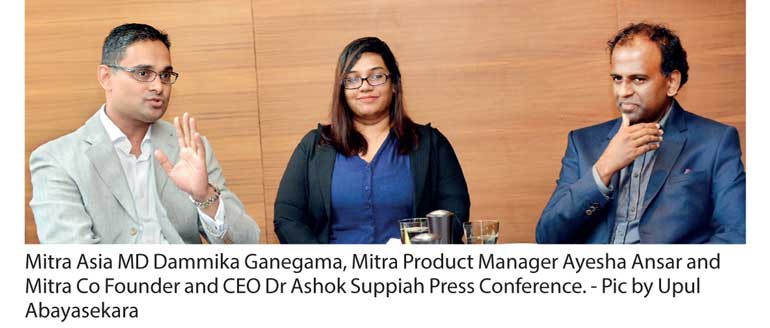Sunday Feb 15, 2026
Sunday Feb 15, 2026
Friday, 19 May 2017 00:08 - - {{hitsCtrl.values.hits}}
 By Madushka Balasuriya
By Madushka Balasuriya
A lack of clear Government policy and muddled bureaucracy are leading to a future in which Sri Lanka is certain to lag even further behind in the global IT sector, industry experts warned on Monday. However, the continuing proactive efforts of the private sector in encouraging youth engagement in the field have the potential to mitigate the issue considerably, they added.
The frank appraisal comes at a time when the Government has publicly stated its goal towards becoming a knowledge and innovation driven economy, something which was to be primarily achieved through the ‘Techno City’ touted in the Western Province Megapolis plan. Yet, according to Ashok Suppiah, this goal seems to be in jeopardy if a more long-term approach is not adopted when it comes to formulating IT-friendly policy in the country.
“If you see the big picture, rather than just comparing with India, if you look at other countries like Korea we are far behind, they have something like a 100-year plan. So they’ve been introducing research into schools – SouthKorea are filing more patents than any other country in the world. Some countries are introducing technology into the school curriculum. Sri Lanka needs a long-term plan - 30, 40 years – tomake a big change, we can’t do small changes. The problem is for this you need a stable government.”
Suppiah is, along with Derek Bell and DammikaGanegama, one of the co-founders of Mitra Innovation, a technology innovation company based in the UK, with offices also in Australia, USA and Sri Lanka. Despite having three offices in Sri Lanka, Mitra only bases its engineering arm in the island nation. Having attempted to break into the Sri Lankan services market with little success five years ago, Suppiah explains that making any further moves into the market would require significant bureaucratic changes.
“We have tried, we have done some local work, we have pitched new ideas… I think, it’s not to say no, we could [enter the market] – ifthere is proper initiative and good funding available.
“Towards the end of last year we were going after the Smart City program. We actually have a framework that could be used with Smart City and we partnered with SAP but it didn’t go anywhere. We don’t have the patience to go through the slow progress in this market.”
Mitra’s stated aim is to assist smart entrepreneurs, enterprises and public service organisations in turning innovative ideas into global solutions, and for 2017 the company has ambitious plans with regard to technology innovation, key to which is doubling its engineering staff. This though, explained Managing Director DammikaGanegama, is proving to be a somewhat troublesome endeavouras Sri Lanka is not producing enough quality software engineers.
“In Sri Lanka our biggest challenge is trying to hire smart, talented people, who fit into our culture, who have the same desire as to be innovative. The reason for this is predominantly brain drain, where the top talented people coming out of local universities are actually going out of the country,” said Ganegama, adding that they have 96% rejection rate when it comes to applicants.
While this is certainly down to Mitra’s high hiring standards, it also speaks to another problem plaguing Sri Lanka’s IT sector: many graduates, regardless of how talented they are, are far below the current entry-level to many top IT firms.
“There is talent, but a lot of the time they’re not structured and groomed well, so it takes a long time tomould them and get them up and running at an acceptable level. From the grassroots level, from the education system, from the universities, this needs to be part of the DNA. If people are going to just be happy with reading a book and thinking that’s what it is, then we won’t progress much.”
The reason for this is twofold. The world of IT and software engineering is constantly evolving with new technologies seemingly being announced on a daily basis. As a result it is key that those in the field are always on top of the latest trends and innovations. When it comes to engineers, accomplishing this feat requires the motivation and drive that companies such as Mitra are looking for.
Mitra Product Manager Ayesha Ansarexplained: “Knowledge is a good stepping point but unless you have the personal motivation to keep learning you’re going to be outdated, because there are organisations that do the base set of skills, but that’s not where the trend is heading.
“We’re moving into things which are not incorporated in the degree program in Sri Lanka. Some students do it as their research projects and they get experience in that arena. The degree program that I studied, the syllabus is the same but the industry has moved on.”